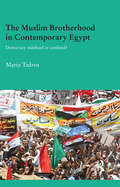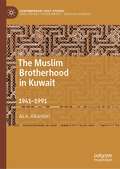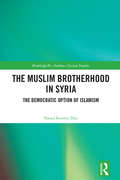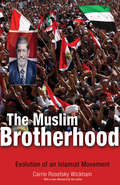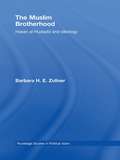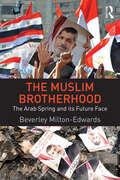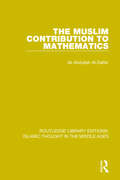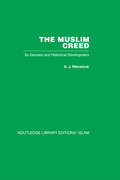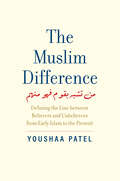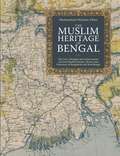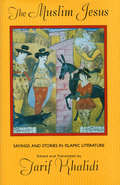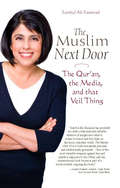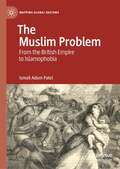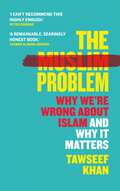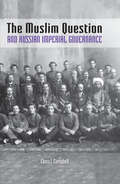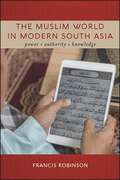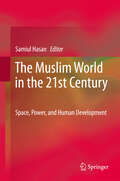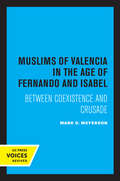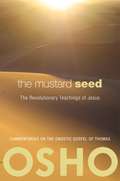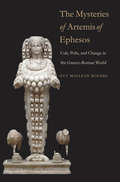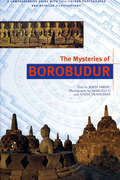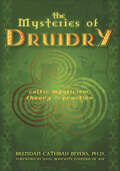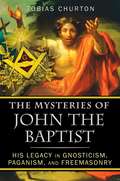- Table View
- List View
The Muslim Brotherhood in Contemporary Egypt: Democracy Redefined or Confined? (Durham Modern Middle East and Islamic World Series)
by Mariz TadrosThe Muslim Brotherhood is one of the oldest and most influential Islamist movements. As the party ascends to power in Egypt, it is poised to adopt a new system of governance and state–society relations, the effects of which are likely to extend well beyond Egypt’s national borders. This book examines the Brotherhood’s visions and practices, from its inception in 1928, up to its response to the 2011 uprising, as it moves to redefine democracy along Islamic lines. The book analyses the Muslim Brotherhood’s position on key issues such as gender, religious minorities, and political plurality, and critically analyses whether claims that the Brotherhood has abandoned extremism and should be engaged with as a moderate political force can be substantiated. It also considers the wider political context of the region, and assesses the extent to which the Brotherhood has the potential to transform politics in the Middle East.
The Muslim Brotherhood in Kuwait: 1941–1991 (Contemporary Gulf Studies)
by Ali A. AlkandariThe Muslim Brotherhood (MB) is the most influential, organized, social, and political movement in Kuwait. With the succession in Kuwait, the role of the organisation become more interesting for people interested in Kuwait and Gulf domestic politics as well as those interested in the MB and Political Islam. This book traces the emergence and development of MB while considering the political and social development of Kuwait that led to its appeal. It explains the evolution of MB’s organisational structure and how it adapted itself during different periods in Kuwait’s history through the Social Movement Theory. It describes MB policies and strategies during challenging times. It traces the circumstances surrounding the emergence of the MB and focuses on its development and its mobilisation strategy. It is certainly one of the first focused studies on MB from its conception in 1941 up to 1991.
The Muslim Brotherhood in Syria: The Democratic Option of Islamism (Routledge/St. Andrews Syrian Studies Series)
by Naomí Ramírez DíazAnyone who follows world events has heard of the Muslim Brotherhood. Usually considered a fundamentalist religious organisation opposed to secular regimes, the so-called Arab Spring began to challenge this conception, and showed the MB’s commitment to democratic principles and elections, albeit with certain difficulties. Until now though, most analysis has focused on the Egyptian branch – the group that gave spiritual birth to the local branches in other countries – with very little having been studied about the Syrian Muslim Brotherhood, especially since the Hama massacre of 1982 and the formal disappearance of the group from Syria. This book provides a deep insight into the Syrian Muslim Brotherhood’s ideological evolution from its inception until present-day. Since Syria has unfortunately become the place where all forms of Islamism converge, understanding the SMB, their ideological evolution, and their potential role as moderating forces, is essential in order to debunk some clichés on the MB in general. Each chapter corresponds to a specific period in the SMB’s timeline, while the final chapter discusses how the endemic gerontocracy of the group calls for an urgent renovation of structures, and stresses the importance of younger generations in renovating the ideology of the SMB. Through the examination of original primary sources written by the SMB themselves, and relevant groups related to them, this book challenges the traditional categories applied to Islamist movements. It will therefore be a key resource for anyone studying Islamist movements, as well as for students and scholars of Middle East and North African Politics.
The Muslim Brotherhood: Evolution of an Islamist Movement - Updated Edition
by Carrie Rosefsky WickhamHow the Muslim Brotherhood rose to power in Egypt, and what it means for the Islamic worldFollowing the Arab Spring, the Muslim Brotherhood achieved a level of influence previously unimaginable. Yet the implications of the Brotherhood's rise and dramatic fall for the future of democratic governance, peace, and stability in the region are disputed and remain open to debate. Drawing on more than one hundred in-depth interviews as well as Arabic-language sources never before accessed by Western researchers, Carrie Rosefsky Wickham traces the evolution of the Muslim Brotherhood in Egypt from its founding in 1928 to the fall of Hosni Mubarak and the watershed elections of 2011-2012. Highlighting elements of movement continuity and change, Wickham demonstrates that shifts in Islamist worldviews, goals, and strategies are not the result of a single strand of cause and effect, and provides a systematic, fine-grained account of Islamist group evolution in Egypt and the wider Arab world.In a new afterword, Wickham discusses what has happened in Egypt since Muhammad Morsi was ousted and the Muslim Brotherhood fell from power.
The Muslim Brotherhood: Hasan al-Hudaybi and ideology (Routledge Studies in Political Islam)
by Barbara ZollnerThe Muslim Brotherhood is one of the most influential Islamist organisations today. Based in Egypt, its network includes branches in many countries of the Near and Middle East. Although the organisation has been linked to political violence in the past, it now proposes a politically moderate ideology. The book provides an in-depth analysis of the Muslim Brotherhood during the years of al-Hudaybi’s leadership, and how he sought to steer the organization away from the radical wing, inspired by Sayyid Qutb, into the more moderate Islamist organization it is today. It is his legacy which eventually fostered the development of non-violent political ideas. During the years of persecution, 1954 to 1971, radical and moderate Islamist ideas emerged within the Brotherhood’s midst. Inspired by Sayyid Qutb’s ideas, a radical wing evolved which subsequently fed into radical Islamist networks as we know them today. Yet, it was during the same period that al-Hudaybi and his followers proposed a moderate political interpretation, which was adopted by the Brotherhood and which forms its ideological basis today.
The Muslim Brotherhood: The Arab Spring and its future face
by Beverley Milton-EdwardsThe Muslim Brotherhood is the most significant and enduring Sunni Islamist organization of the contemporary era. Its roots lie in the Middle East but it has grown into both a local and global movement, with its well-placed branches reacting effectively to take the opportunities for power and electoral competition offered by the Arab Spring. Regarded by some as a force of moderation among Islamists, and by others as a façade hiding a terrorist fundamentalist threat, the potential influence of the Muslim Brotherhood on Middle Eastern politics remains ambiguous. The Muslim Brotherhood: The Arab Spring and its Future Face provides an essential insight into the organisation, with chapters devoted to specific cases where the Brotherhood has important impacts on society, the state and politics. Key themes associated with the Brotherhood, such as democracy, equality, pan-Islamism, radicalism, reform, the Palestine issue and gender, are assessed to reveal an evolutionary trend within the movement since its founding in Egypt in 1928 to its manifestation as the largest Sunni Islamist movement in the Middle East in the 21st century. The book addresses the possible future of the Muslim Brotherhood; whether it can surprise sceptics and effectively accommodate democracy and secular trends, and how its ascension to power through the ballot box might influence Western policy debates on their engagement with this manifestation of political Islam. Drawing on a wide range of sources, this book presents a comprehensive study of a newly resurgent movement and is a valuable resource for students, scholars and policy makers focused on Middle Eastern Politics.
The Muslim Contribution to Mathematics (Routledge Library Editions: Islamic Thought In The Middle Ages Ser. #6)
by Ali Abdullah Al-Daffa'This book, first published in 1977, discusses the Muslim contribution to mathematics during the golden age of Muslim learning from the seventh to the thirteenth century. It was during this period that Muslim culture exerted powerful economic, political and religious influence over a large part of the civilised world. The work of the Muslim scholars was by no means limited to religion, business and government. They researched and extended the theoretical and applied science of the Greeks and Romans of an earlier era in ways that preserved and strengthened man’s knowledge in these important fields. Although the main object of this book is to trace the history of the Muslim contribution to mathematics during the European Dark Ages, some effort is made to explain the progress of mathematical thought and its effects upon present day culture. Certain Muslim mathematicians are mentioned because of the important nature of their ideas in the evolution of mathematical thinking during this earlier era. Muslim mathematicians invented the present arithmetical decimal system and the fundamental operations connected with it – addition, subtraction, multiplication, division, raising to a power, and extracting the square root and the cubic root. They also introduced the ‘zero’ symbol to Western culture which simplified considerably the entire arithmetical system and its fundamental operations; it is no exaggeration if it is said that this specific invention marks the turning point in the development of mathematics into a science.
The Muslim Creed: Its Genesis and Historical Development
by A J WensinckOriginally published in 1932. This volume is a comprehensive study of the historical development of Muslim dogmatics and consists of translations and commentaries on the creed in its various forms.
The Muslim Difference: Defining the Line between Believers and Unbelievers from Early Islam to the Present
by Youshaa PatelA sweeping history of Muslim identity from its origins in late antiquity to the present How did Muslims across time and place define the line between themselves and their neighbors? Youshaa Patel explores why the Prophet Muhammad first advised his followers to emulate Christians and Jews, but then allegedly reversed course, urging them to &“be different!&” He details how subsequent generations of Muslim scholars canonized the Prophet&’s admonition into an influential doctrine against imitation that enjoined ordinary believers to embody and display their religious difference in public life. Tracing this Islamic discourse from its origins in Arabia to Mamluk and Ottoman Damascus, colonial Egypt, and beyond, this sweeping intellectual and social history offers a panoramic view of Muslim identity, revealing unexpected intersections between religion and other markers of difference across ethnicity, gender, and status. Patel illustrates that contemporary debates in the West over visible expressions of Islam, from headscarves and beards to minarets and mosques, are just the latest iterations in a long history of how small differences have defined Muslim interreligious encounters.
The Muslim Heritage of Bengal
by Muhammad Mojlum Khan"The Muslim Heritage of Bengal is a multidimensional work. . . . I am sure this book will add to the vista of knowledge in the field of Muslim history and heritage of Bengal. I recommend this work."-Dr A. K. M. Yaqub Ali, Professor Emeritus, Islamic History & Culture, University of Rajshahi"Khan's book provides invaluable information which will inspire present and future generations."-Dr M. Abdul Jabbar Beg, former professor of Islamic History and Civilization, National University of MalaysiaA popular history that covers eight hundred years of the history of Islam in Bengal through the example of forty two inspirational men and women up until the twentieth century. Written by the author of the bestselling The Muslim 100.Included are the prominent figures Shah Jalal, Nawab Abdul Latif, Rt. Hon. Syed Ameer Ali, Sir Salimullah Khan Bahadur, and Begum Rokeya.Muhammad Mojlum Khan was born in 1973 in Habiganj, Bangladesh, and was educated in England. He is a teacher, author, literary critic, and research scholar, and has published more than 150 essays and articles worldwide. He is the author of The Muslim 100 (2008). He is a Fellow of the Royal Asiatic Society of Great Britain and Director of the Bengal Muslim Research Institute, United Kindgom. He lives in England with his family.
The Muslim Jesus: Sayings and Stories in Islamic Literature (Convergences #28)
by Tarif KhalidiThis work presents in English translation the largest collection ever assembled of the sayings and stories of Jesus in Arabic Islamic literature. In doing so, it traces a tradition of love and reverence for Jesus that has characterized Islamic thought for more than a thousand years. An invaluable resource for the history of religions, the collection documents how one culture, that of Islam, assimilated the towering religious figure of another, that of Christianity. As such, it is a work of great significance for the understanding of both, and of profound implications for modern-day intersectarian relations and ecumenical dialogue. Tarif Khalidi’s introduction and commentaries place the sayings and stories in their historical context, showing how and why this “gospel” arose and the function it served within Muslim devotion. The Jesus that emerges here is a compelling figure of deep and life-giving spirituality. The sayings and stories, some 300 in number and arranged in chronological order, show us how the image of this Jesus evolved throughout a millennium of Islamic history.
The Muslim Next Door
by Sumbul Ali-Karamali- Bronze Medal Winner of the Independent Publishers Award 2009 -Since 9/11, stories about Muslims and the Islamic world have flooded headlines, politics, and water-cooler conversations all across the country. And, although Americans hear about Islam on a daily basis, there remains no clear explanation of Islam or its people. The Muslim Next Door offers easy-to-understand yet academically sound answers to these questions while also dispelling commonly held misconceptions. Written from the point of view of an American Muslim, the book addresses what readers in the Western world are most curious about, beginning with the basics of Islam and how Muslims practice their religion before easing into more complicated issues like jihad, Islamic fundamentalism, and the status of women in Islam. Author Sumbul Ali-Karamali's vivid anecdotes about growing up Muslim and female in the West, along with her sensitive, scholarly overview of Islam, combine for a uniquely insightful look at the world's fastest growing religion.
The Muslim Next Door
by Sumbul Ali-Karamali- Bronze Medal Winner of the Independent Publishers Award 2009 -Since 9/11, stories about Muslims and the Islamic world have flooded headlines, politics, and water-cooler conversations all across the country. And, although Americans hear about Islam on a daily basis, there remains no clear explanation of Islam or its people. The Muslim Next Door offers easy-to-understand yet academically sound answers to these questions while also dispelling commonly held misconceptions. Written from the point of view of an American Muslim, the book addresses what readers in the Western world are most curious about, beginning with the basics of Islam and how Muslims practice their religion before easing into more complicated issues like jihad, Islamic fundamentalism, and the status of women in Islam. Author Sumbul Ali-Karamali's vivid anecdotes about growing up Muslim and female in the West, along with her sensitive, scholarly overview of Islam, combine for a uniquely insightful look at the world's fastest growing religion.
The Muslim Next Door: The Qur'an, the Media, and That Veil Thing
by Sumbul Ali-Karamali- Bronze Medal Winner of the Independent Publishers Award 2009 -Since 9/11, stories about Muslims and the Islamic world have flooded headlines, politics, and water-cooler conversations all across the country. And, although Americans hear about Islam on a daily basis, there remains no clear explanation of Islam or its people. The Muslim Next Door offers easy-to-understand yet academically sound answers to these questions while also dispelling commonly held misconceptions. Written from the point of view of an American Muslim, the book addresses what readers in the Western world are most curious about, beginning with the basics of Islam and how Muslims practice their religion before easing into more complicated issues like jihad, Islamic fundamentalism, and the status of women in Islam. Author Sumbul Ali-Karamali's vivid anecdotes about growing up Muslim and female in the West, along with her sensitive, scholarly overview of Islam, combine for a uniquely insightful look at the world's fastest growing religion.
The Muslim Problem: From the British Empire to Islamophobia (Mapping Global Racisms)
by Ismail Adam PatelThis book explains the increasing incidences and normalisation of Islamophobia, by analysing the role of signifiers of free speech, censorship, and fatwa during the Satanic Verses affair in problematising the figure of the Muslim. Ismail Patel develops the notion of Islamophobia not as a continuation of the antagonistic relation from the British Empire but as a postcolonial reformulation of the figure of the Muslim. The book views Islamophobia studies as a paradigm, engages in the debate of Islamophobia as a global phenomenon, investigates the contestation over its definition and challenges the view of Islamophobia as a reserve of the far-right. It assesses the debate around the concept of identity and shows how the colonised figure of the Muslim provided significance in constructing British imperial identity. Providing a decolonial, counter-Islamophobia approach that challenges Britishness’ exclusionary white symbolic content, the book calls for a liberating idea of Britishness that promotes a post-racist rather than a post-race society. Theoretically rich in analysis, this book will contribute to discussions of identity formation, Britishness, Islamophobia and counter-Islamophobia. It will be of use to students and researchers across history, politics, sociology, cultural studies, literary studies, and anthropology.
The Muslim Problem: Why We're Wrong About Islam and Why It Matters
by Tawseef KhanWhy are Muslim men portrayed as inherently violent? Does the veil violate women's rights? Is Islam stopping Muslims from integrating? Across western societies, Muslims are more misunderstood than any other minority. But what does it mean to believe in Islam today, to have forged your beliefs and identity in the shadow of 9/11 and the War on Terror? Exploding stereotypes from both inside and outside the faith, The Muslim Problem shows that while we may think we know all about Islam we are often wrong about even the most basic facts. Bold and provocative, The Muslim Problem is both a wake-up call for non-believers and a passionate new framework for Muslims to navigate a world that is often set against them.
The Muslim Question and Russian Imperial Governance
by Elena I. Campbell“A major contribution to the history of nationality, religious identity, and governance in late imperial Russia.” —William G. Rosenberg, coauthor of Processing the PastFrom the time of the Crimean War through the fall of the Tsar, the question of what to do about the Russian empire’s large Muslim population was a highly contested issue among educated Russians both inside and outside the government. As formulated in the nineteenth and early twentieth centuries, the Muslim Question comprised a complex set of ideas and concerns that centered on the problems of reimagining and governing the tremendously diverse Russian empire in the face of the challenges presented by the modernizing world. Basing her analysis on extensive research in archival and primary sources, Elena I. Campbell reconstructs the issues, debates, and personalities that shaped the development of Russian policies toward the empire’s Muslims and the impact of the Muslim Question on the modernizing path that Russia would follow.“Readable, original, and endlessly interesting, Campbell’s book deserves the very highest praise.” —Journal of Islamic Studies“Campbell’s book shows how profound official Islamophobia paradoxically led to the preservation of earlier confessional structures, grudging non-interference with the spiritual and social life of most Muslim communities, a restraining hand on the actions (if not the rhetoric) of Orthodox missionaries, and a certain uneasy toleration.” —Slavonic and East European Review“A major contribution to the understanding of Russia’s ‘Muslim Question’—past and present . . . Recommended.” —Choice
The Muslim World in Modern South Asia: Power, Authority, Knowledge
by Francis RobinsonSets out the challenges presented to Muslim societies by Western dominance over the past two hundred years, and explores Muslim responses, particularly in the context of South Asia.Over the past two hundred years, two great processes have shaped Muslim societies: Western domination and the industrial capitalism that came with it, and the Islamic revival that preceded the Western presence but came to interact significantly with it. In this book, Francis Robinson considers the challenges Western dominance has offered key aspects of Muslim civilization, particularly in the context of South Asia, which in the nineteenth century moved from being a receiver of influences from the rest of the Muslim world to being a transmitter of influences to it.Robinson also considers aspects of the Muslim revival and how they have come to shape, in various ways, Muslim responses to Western dominance. The role of the transmission of knowledge, both formal and spiritual, in forming Muslim societies is explored, and also the particular role of the transmitters in sustaining the Islamic dimensions of Muslim societies under Western dominance. Attention, too, is paid to the imposition of the modern state and the restriction of cosmopolitan spaces.
The Muslim World in the 21st Century
by Samiul HasanIslam is not only a religion, but also a culture, tradition, and civilization. There are currently 1.5 billion people in the world who identify themselves as Muslim. Two thirds of the worldwide Muslim population, i.e. approximately a billion people, live in forty-eight Muslim majority countries (MMC) in the world- all of which except one are in Africa and Asia. Of these MMCs in Africa and Asia, only twelve (inhabited by about 165 million people) have ever achieved a high score on the Human Development Index (HDI), the index that measures life expectancy at birth, education and standard of living and ranks how "developed" a country is. This means that the majority of the world's Muslim population lives in poverty with low or medium level of human development. The contributions to this innovative volume attempt to determine why this is. They explore the influence of environment, space, and power on human development. The result is a complex, interdisciplinary study of all MMCs in Africa and Asia. It offers new insights into the current state of the Muslim World, and provides a theoretical framework for studying human development from an interdisciplinary social, cultural, economic, environmental, political, and religious perspective, which will be applicable to regional and cultural studies of space and power in other regions of the world.
The Muslims of Valencia in the Age of Fernando and Isabel: Between Coexistence and Crusade
by Mark D. MeyersonThe kingdom of Valencia was home to Christian Spain's largest Muslim population during the reign of the Catholic Monarchs, Fernando and Isabel. How did Muslim-Christian coexistence in Valencia remain relatively stable in this volatile period that saw the establishment of the Spanish Inquisition, the Expulsion of the Jews, the conquest of Granada, and the conversion of the Muslims of Granada and Castile? In explanation, Mark Meyerson achieves the first thorough analysis of Fernando and Isabel's policy toward both Muslims and Jews. His findings will stimulate much discussion among Hispanists, Arabists, and historians. Meyerson argues that the key to the persistence of Muslim-Christian coexistence in Valencia lies in the hitherto unexamined differences between the royal couple concerning matters of religion. More than a study of the minority policy of the Catholic Monarchs, however, The Muslims of Valencia is an exemplary analysis of the economic life of Valencia's Muslims and the complex institutional and social network that held them suspended "between coexistence and crusade." This title is part of UC Press's Voices Revived program, which commemorates University of California Press’s mission to seek out and cultivate the brightest minds and give them voice, reach, and impact. Drawing on a backlist dating to 1893, Voices Revived makes high-quality, peer-reviewed scholarship accessible once again using print-on-demand technology. This title was originally published in 1991.
The Mustard Seed
by Osho Osho International FoundationThis timely book explores the wisdom of the Gnostic Jesus, who challenges our preconceptions about the world and ourselves. Based on the Gospel of Thomas, the book recounts the missing years in Jesus' life and his time in Egypt and India, learning from Egyptian secret societies, then Buddhist schools, then Hindu Vedanta. Each of Jesus' original sayings is the "seed" for a chapter of the book; each examines one aspect of life - birth, death, love, fear, anger, and more - counterpointed by Osho's penetrating comments and responses to questions from his audience.
The Mysteries of Artemis of Ephesos
by Guy Maclean RogersArtemis of Ephesos was one of the most widely worshiped deities of the Graeco-Roman World. Her temple, the Artemision, was one of the seven wonders of the ancient world, and for more than half a millennium people flocked to Ephesos to learn the great secret of the mysteries and sacrifices that were celebrated every year on her birthday. In this work Guy MacLean Rogers sets out the evidence for the celebration of Artemis's mysteries against the background of the remarkable urban development of the city during the Roman Empire and then proposes an entirely new theory about the great secret that was revealed to initiates into Artemis's mysteries. The revelation of that secret helps to explain not only the success of Artemis's cult and polytheism itself but, more surprisingly, the demise of both and the success of Christianity. Contrary to many anthropological and scientific theories, the history of polytheism, including the celebration of Artemis's mysteries, is best understood as a Darwinian tale of adaptation, competition, and change.
The Mysteries of Borobudur
by John Miksic Marcello TranchiniThe Mysteries of Borobudur provides a comprehensive guide to the history and architecture of the monument in word and picture, with an informative text, complemented by colour photographs, maps, site plans and other visual materials
The Mysteries of Druidry: Celtic Mysticism, Theory & Practice
by Brendan Cathbad Myers“A clear, accessible, and forthright exploration of Celtic tradition as the foundation of a personal path of mystical transformation.” —John Michael Greer, former Grand Archdruid, Ancient Order of Druids in America, and author of The Druidry HandbookThe Druids were the mystics, philosophers, and magicians of the ancient Celtic world. Their spirituality was borne from their near-worship of poetry and music, their warrior prowess, and the world of nature. The Mysteries of Druidry reveals this mystical romanticism as it was in ancient times, and shows various ways to bring it to life today. It includes:A professionally researched survey of Druidic history, tradition, and customsDetailed descriptions of the mysteries of Celtic spirituality, including the Sacred Truth, the Great Marriage, the Hero’s Journey, and the OtherworldPractical guidance for meditation and ceremony, for individuals and for groupsThe Celtic story of the creation of the world, presented together with a plan for re-enacting the story in ritual“An exemplary look at one man’s approach to Druidism, with excellent food for thought and suggestions for group ritual and personal practice . . . His personal stories of working with and discovering the spirits of the land are inspiring and useful guides to the readers.” —Erynn Laurie, author of A Circle of Stones, cofounder of the Inis Glas Hedge School“With gentle clarity, [Myers] writes not only of myth, folklore, and Celtic history, but also of and for our Celtic present. With his words, he inspires, calling the reader to breathe in the songs of the ancestors, and so to sing those songs with both a celebratory pride and a profound relevance for today.” —Emma Restall Orr, Joint Chief of the British Druid Order; author of Kissing the Hag
The Mysteries of John the Baptist: His Legacy in Gnosticism, Paganism, and Freemasonry
by Tobias ChurtonThe search for the real historical person known as John the Baptist and the traditions that began with him • Explores why John the Baptist is so crucially important to the Freemasons, who were originally known as “St. John’s Men” • Reveals how John and Jesus were equal partners and shared a common spiritual vision to rebuild Israel and overcome corruption in the Temple of Jerusalem • Explains the connections between John as lord of the summer solstice, his mysterious severed head, fertility rites, and ancient Jewish harvest festivals Few Freemasons today understand why the most significant date in the Masonic calendar is June 24th--the Feast of the Birth of St. John the Baptist and the traditional date for appointing Grand Masters. Nor do many of them know that Masons used to be known as “St. John’s Men” or that John the Baptist was fundamental to the original Masonic philosophy of personal transformation. Starting with the mystery of John in Freemasonry, Tobias Churton searches out the historical Baptist through the gospels and ancient histories, unearthing the real story behind the figure lauded by Jesus’s words “no greater man was ever born of woman.” He investigates John’s links with the Essenes and the Gnostics, links that flourish to this day. Exposing how the apostle Paul challenged John’s following, twisting his message and creating the image of John as “merely” a herald of Jesus, the author shows how Paul may have been behind the executions of both John and Jesus and reveals a precise date for the crucifixion and the astonishing meaning of the phrase “the third day.” He examines the significance of John’s severed head to holy knights, such as the Knights Templar, and of Leonardo’s famous painting of John. Churton also explains connections between John, the summer solstice, fertility rites, and ancient Jewish harvest festivals. Revealing John as a courageous, revolutionary figure as vital to the origins of Christianity as his cousin Jesus himself, Churton shows how John and Jesus, as equal partners, launched a covert spiritual operation to overcome corruption in the Temple of Jerusalem, re-initiate Israel, and resurrect Creation.
